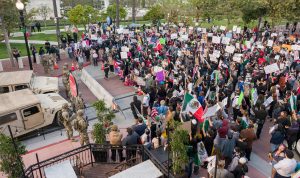Last week, Ehud Olmert, a former Prime Minister of Israel, publicly denounced his successor, Benjamin Netanyahu, and the war Netanyahu has been waging in Gaza. In apieceforHaaretz, titled “Enough Is Enough. Israel Is Committing War Crimes,” Olmert referred to the current government as a “criminal gang” led by Netanyahu. He wrote, “What we are doing in Gaza now is a war of devastation: indiscriminate, limitless, cruel and criminal killing of civilians. We’re not doing this due to loss of control in any specific sector, not due to some disproportionate outburst by some soldiers in some unit. Rather, it’s the result of government policy—knowingly, evilly, maliciously, irresponsibly dictated. Yes, Israel is committing war crimes.” Olmert’s comments follow Israel’s decision to finally allow humanitarian aid into the Gaza Strip, after a near-total blockade for more than two months led the United Nations and even the Trump Administration to issue warnings that the population was facing starvation. But Israel has tried to distribute the aid under a new scheme that humanitarian organizations and the United Nations have warned is insufficient and dangerous, in part because it requires many Gazans to travel long distances to receive aid. In the last several days,scoresof Gazans have been killedby Israeli forceswhile trying to get food and other necessities at the few locations where they are on offer.
Olmert, who served as Prime Minister between 2006 and 2009, was once a member of Netanyahu’s Likud Party, before joining and then leading the more centrist Kadima Party. As Prime Minister, he took steps to reach a peace accord with Palestinians, but failed to do so; allegations of corruption cut short his political career. (Olmert eventuallyservedmore than a year in prison, starting in 2016.) I recently spoke by phone with Olmert about his criticisms of the war. During our conversation, which has been edited for length and clarity, we also discussed his understanding of Netanyahu’s motivations, whether the Israeli government has a plan for Palestinians in Gaza, and why the crisis in Israel is about more than Netanyahu’s ability to stay in power.
In your recentHaaretzpiece, you write, “I took every available opportunity to distinguish between the crimes we have been accused of, which I refused to admit, and the carelessness and indifference regarding Gazan victims and the unbearable human cost we’ve been levying there. The first accusation I rejected, the second I admitted to. In recent weeks I’ve been no longer able to do so.” What did you mean, and what changed?
Look, no government, not even Bibi’s government, which as you know I don’t support, and certainly not the high command of the Army, gave explicit orders to kill indiscriminately, to shoot indiscriminately wherever, whatever, doesn’t matter. That’s not the case. For a long period of time, the war was perceived as legitimate, and I defended the government on that ground. The Israeli counteroffensive was recognized as just considering the brutal attack of Hamas on the 7th of October. There was a need to find Hamas leaders wherever they were hidden, sometimes underground, and in public facilities. And, even when there was a relatively high number of victims among the people living in Gaza, the understanding was that you can’t, on the one hand, recognize Israel’s right to find the leaders and the fighters of Hamas and, on the other hand, deny that they are embedded in the most densely populated areas, where there are many, many civilians. And you can’t find them without causing collateral damage, which was not liked, but which was not a purpose of the military effort. And therefore, regardless of the high number of victims, it was accepted by the international community.
What has happened lately is that it is obvious to everyone that there is no purpose that can justify the expansion of these military activities. There is not any goal that can justify continuing the military operation at the risk of losing the hostages, at the risk of losing the lives of Israeli soldiers, and the risk of losing the lives of many of the non-involved people in Gaza. There is not any purpose. The perception in Israel is that this is a personal war or illegitimate war that is being conducted exclusively because of the political interests of the Prime Minister. This is a crime. This is not something that can be defended. And the fact that there are so many victims can’t be justified. It’s as simple as that.
At the beginning, the war had more international legitimacy, but pretty early on, in, say, December of 2023, President Biden, who was a supporter of the war and was in fact arming Israel, called Israel’s bombing “indiscriminate.” Israel at various times cut off aid and caused a real humanitarian crisis, too.
Cutting aid is a different aspect. You didn’t ask me directly about Biden, but I have an enormous positive emotional attitude to President Biden. Personally, I like him. I know him. We’ve been kind of friends for many years. I think that there couldn’t be a better friend, a more dedicated Zionist in the White House than Biden was, and the criticism against him is outright arrogance and something that can’t be accepted, and can’t be tolerated.
O.K., well, we don’t need to debate President Biden.
O.K., I don’t want to debate, but I want to be on record saying it about him.
I just want to be clear that the concerns about Israel’s conduct in the war did not arise recently.
No, no, it’s true that criticism about the conduct of the war didn’t arise recently. But between criticism and an outright accusation of war crimes, there is still a certain distinction, and I think that even those who criticized Israel from overseas were careful. I’m not talking about N.G.O.s, pro-Palestinian organizations. I’m talking about governments that were friendly to Israel, like the U.S. government, like the British government, like the French government. Macron criticized Israel for a considerable time. He didn’t speak half a year ago the way he speaks now. The difference is a result of what is perceived to be a non-legitimate expansion of the military operation, and the understanding that Netanyahu doesn’t want to reach an agreement with Hamas for the release of the hostages.
Right, but people have been saying that Netanyahu wants to drag the war on for political reasons for well over a year.
I’ve been saying it. I called to end the war more than a year ago.
You also write, “I do not share the opinion of former Chief of Staff Moshe Yaalon, who said that Israel is carrying out ethnic cleansing. But we are nearing the point when it will be undeniable that such is the unavoidable result of what the government, the military and our brave soldiers have been doing in practice.” Can you expand on that, and why you don’t share Yaalon’s opinion?
I think that the present policy of the government is not yet an active effort to deport the people of Gaza from where they live. However, when you hear [the right-wing ministers] Itamar Ben-Gvir and Bezalel Smotrich—they’re not bystanders, they’re not outsiders. They are the key members of this government. They are the key spokesmen of this government. When they say that all of Gaza is Hamas and therefore there is no one that deserves to be given food and that they all have to be deported, this is what it is. [Smotrich and Ben-Gvir proposed denying aid to Gazans and expelling them from the Strip in the first months of the war.] It can be interpreted as ethnic cleansing. It’s not that we are really forcing hundreds of thousands of people across the border. But when you hear these things, you can’t remain indifferent, you can’t overlook it. You can’t just hear it and say, “O.K., let’s move on.” No, no. This is something that is totally intolerable. Anyone that has any position that doesn’t draw the inevitable conclusion is potentially a partner to a crime of a very, very serious manner.
This makes me think of something that comes up later in your piece. You write, “Yes, we’ve been denying Gazans food, medicine and basic living needs as part of an explicit policy. Netanyahu, typically, is trying to blur the type of orders he’s been giving, in order to evade legal and criminal responsibility in due course. But some of his lackeys are saying so outright, in public, even with pride: Yes, we will starve out Gaza.” So, you believe the starvation is intentional, but cleansing Gaza—even if it may happen in practice, and ministers in Netanyahu’s government want it—is not? It seems like you’re making a distinction between Israel’s intent in terms of starvation and the intent in terms of ethnic cleansing. Is that accurate?
Let’s put it this way. First of all, for a period of time, starvation was the practical policy of the Israeli government. Humanitarian supplies were denied. Denied. Actively denied and stopped and held. There was not yet, at any period of time, an active policy of deporting people. [Ethnic cleansing is not by itself a crime in international law, but usually refers to the intentional forcible displacement of an ethnic population from a certain area regardless of whether it includes crossing a border.] But on both the humanitarian needs and the deportation or cleansing of Gaza of its residents, Ben-Gvir and Smotrich are on record advocating for them, pushing for them, supporting them, calling for them, and also threatening the government that they will break it down if it does not accomplish them.
Netanyahu is trying to avoid direct contact. But this is his government; he’s the Prime Minister. In my government, no one would’ve been able to say such a thing and remain a member of the Cabinet for another minute. And he’s making every possible effort to keep them. He’s actively a partner to these statements and to the possible ramifications of these statements.
Early in our interview, and in your piece, you said that this was a war “without purpose, without goals.” It seems like what you’re saying is that, essentially, on humanitarian aid and starvation, there was an intentional policy in place, but that there wasn’t one on ethnic cleansing. Are the goals of this military operation, at this point, simply to keep Netanyahu in power or do you think of it as having some larger political objective?
If you ask Netanyahu, he will argue heatedly that he wants to eliminate Hamas completely, and in order to reach a total victory, you have to carry on. You can’t have a deal that may save the remaining hostages at the cost of ending the war. However, there is not one single person that has any experience or understanding or knowledge of what’s going on that agrees that there is any serious chance of eliminating completely every single person that holds a gun or an R.P.G. or a hand grenade in Gaza.
It’s ridiculous. A year ago, he said we are almost on the verge of total victory. Now he says we have to expand the war with five ground divisions. And we know that Ben-Gvir and Smotrich said in the most explicit manner that if there is another deal for a ceasefire, they will resign and they will bring down the government. There is no way that you can avoid the inevitable conclusion that what bothers Netanyahu is his personal survivability and the political stability of this Cabinet over anything else.
So the upshot of what you’re saying is that if the political incentives demand that Netanyahu ethnically cleanse Gaza, then that may happen. If the political incentives demand something else, then we may go there. It’s all just driven by those incentives.
That’s right. And, at some point, even when it’s not an explicit policy of his government to ethnically cleanse and kill indiscriminately, it is inevitable. Even if it is not his stated policy, at some point the events on the ground can’t be interpreted in any other way.
In an earlieressay, you wrote about the settler community: “Many of them justify the continuation of the fighting in Gaza and call to expand the fighting in the north, so they can continue the work of destruction and obliteration in the West Bank.” It seemed like you were trying to say that, in the minds of people like Smotrich and Ben-Gvir, there may be a connection between the war in Gaza and the situation in the West Bank. What did you mean?
You must have a good sense of humor. I’m not suggesting that there “may be” a certain connection. These are the same people, and they advocate what is happening in the West Bank explicitly, publicly, continually, all the time, in the most obvious manner. I mean, there is no question about it. A settlement leader, when eulogizing a woman who was murdered when she was about togive birtha few weeks ago, asked why a nearby Palestinian village was still standing. This is also what they want to do in Gaza.
In your piece, you say, “The military, charged with and duty-bound to execute government orders, acted in many cases rashly, incautiously, over-aggressively. However, it did so without any order or instruction or directive from military top brass to hit civilians indiscriminately. Therefore, as I understood it at the time, no war crimes had been committed.” I just want to clarify this, because you were once the Prime Minister and oversaw military actions. It is possible to commit war crimes without an order from top military brass to commit those crimes, yes?
Yes. But as I said, when I spoke to international media earlier in the war, everywhere in America, in Europe, everywhere, I kept saying there is not a policy of genocide or of war crimes. Why? Because there was not such a policy in any meeting or command session between the political leadership and the military leadership. There was never an order that, even by gross exaggeration, could be interpreted as permission to kill indiscriminately.
However, we all served in the Army, we all were in wars, and this is a very tight and demanding and challenging and sometimes scary situation for many. And sometimes the soldiers can do things which are totally unacceptable and can be called crimes. But it was not a policy. There was not a decision. No one told them to do it. In the heat of the battle, in the exchange of firing and shooting, there was sometimes a reckless reaction, disproportionate, which may have caused unnecessary victims, but not killing for the sake of killing. That doesn’t mean that there were not many victims, a disproportionate number of victims that regrettably should have been prevented, maybe by a better or more effective military operation. But this is not a war crime or genocide or anything close to it.
Well, those can be war crimes. It wouldn’t be genocide necessarily.
It could be a crime. There could be a defense explaining it and somehow providing the proper framework for understanding it. Not to justify it.
You say in your piece that war crimes are in fact going on now, while still claiming there is not a “policy” of war crimes. So what war crimes do you acknowledge are happening?
Look at the West Bank. The daily attacks against Palestinians in their homes and olive groves and properties amount to war crimes, particularly when the police fail to arrest the attackers, and arrest the Palestinian victims instead.
When everyone says that there is not any basis for continuing the war and it’s only the political considerations of Netanyahu, and that means the loss of Israeli soldiers and hostages and Palestinians, it’s a crime.
But you have been arguing for a very long time that he has been continuing the war for political reasons.
Yes, but now it doesn’t have the legitimacy of a military operation.
Haaretzreported that, according to a recent poll, eighty-two per cent of Israeli Jews “support ‘the transfer (expulsion) of residents of the Gaza Strip to other countries.’ ” The report went on, “When asked directly whether they agreed with the position that the IDF, ‘when conquering an enemy city, should act in a manner similar to the way the Israelites acted when they conquered Jericho under the leadership of Joshua, namely, to kill all its inhabitants?’ nearly half, 47 percent, agreed.” Do you find these numbers credible, and does it feel like that describes the bleak situation politically in Israel that any non-Netanyahu leader would face?
I just don’t know. However, I do want to say one thing. There is a man in the Knesset who is close to Ben-Gvir and Smotrich named Zvi Sukkot who says “nobody cares” that Palestinians were killed. So there is this attitude of revenge that does exist among a considerable number of people in Israel, and this is something that has to be fought against with all the power that is needed, because this is very dangerous. I’m fighting for the soul of Israel. The fact that there are Israelis that can say this stuff publicly—“nobody cares”? No. I care.
It seems like what you’re saying then is that this isn’t just about dislodging Netanyahu from power, if you’re talking about the soul of Israel. Even if Netanyahu were to be dislodged from power, the problem is much deeper.
Yeah, but the change has to start somewhere. Israel was not like this. Israel was not like this. Definitely the shock of the 7th of October had an enormous impact on the attitudes and emotions of many Israelis. And of course everything comes along with the memories and the fears, the historic fears and the expressions of antisemitism spreading across the world. But before this Israel was a much safer, more self-confident society. What Netanyahu did in the last few years, starting before October 7th, was to create an environment of hysteria. We can’t talk with the Palestinian Authority. We have to fight all of them. Iran is about to destroy the state of Israel. Hezbollah is about to destroy the state of Israel. A certain spirit of desperation was cultivated in a very calculated manner by the Prime Minister, because the only way to possibly unite Israeli society against all enemies is by creating a sense of lack of confidence in the very existence of the state of Israel, which is, in non-polite language, bullshit.
One has to understand something. We had to react to the 7th of October. But there was not one second that the existence of Israel was in danger, not even on the 7th of October. And to say that the empire of the state of Israel, with all the power that we possess, was in danger or is now in danger, and that that justifies expanding the military operations, is nonsense. It is a policy that has been developed and elaborated by the Prime Minister in order to justify the attitude that there is not any chance to have peace. So we continue forever. ♦









